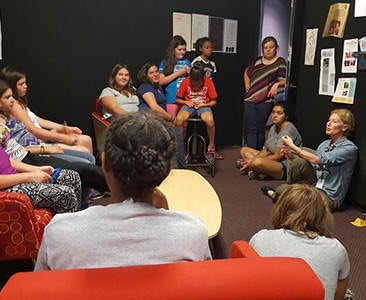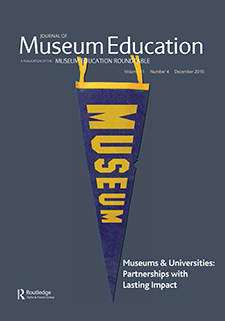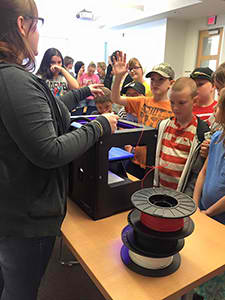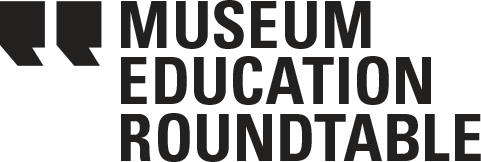The End of One Thing, the Beginning of Something Else

Over the last seven years, we’ve spent a lot of time telling stories from our successful AmeriCorps Cultural Technology (ACT) museum internship program. This program, which embeds our New Mexico Highlands University media arts & technology students and recent grads in paid long-term service positions in museums, libraries, and historic sites, has been running since 2010. There have been articles, blog posts, presentations, celebrations, and many grant proposals. The stories that we’ve collected, the data that we’ve analyzed, and the student success that continues to ripple outward has built our reputation both in New Mexico and nationally. Observing the long-term relationships between our interns and their mentors has been immensely satisfying. If you haven’t read the article in the current Journal of Museum Education and if you have an interest in how paid university/museum partnerships can create institutional change, you can read the history, statistics, and program information in detail, here.

We began writing the Journal of Museum Education (JME) article in the fall of 2015. What a difference a year makes, sadly (this may be the understatement of the century). At that time, we were in our sixth year of receiving New Mexico AmeriCorps state funding to support our program. We recently learned that our funding would not continue in our eighth year, despite our proven success and the program being used as a national model. Curiously, our proposal review rating dropped from being one of the highest ranked in the state since 2012, to a rating that disqualified us from applying for federal funding. There isn’t a clear explanation of this, because we only receive a number ranking, not a detailed written report. Transparency is a concern, and written specifics “will not be provided by the review committee.” We were entitled to one phone call with the executive director, which occurred on January 27th. On the call, we were read comments collected from the five peer reviewers. Overall, two reviewers rated us favorably, two were positive/neutral and one eviscerated our program, repeatedly using the comment “weak proposal” and finally stating, “this is not an appropriate use of an AmeriCorps program.” This is disconcerting, since our “past performance” ranking was 70/75 (excellent). We are not permitted to question these ratings. On the one hand, this is bizarre and upsetting, on the other, it’s likely that AmeriCorps will be closely scrutinized by the current federal administration, and that we would be facing funding insecurity soon enough.
AmeriCorps is a program with stringent compliance requirements. Each year, these became more baroque, but we saw the value in participating in this program, so we went to great lengths to meet them. That said, the requirements of AmeriCorps gave us some structures that will continue in the new model, such as three starting dates per year (October 1, February 1, and June 1) that allow us to streamline the contract and payment process for the interns. Also, we required a 1-credit course for all participants, the “Cultural Technology Mentorship” class, that met weekly for field trips, discussions, and to support each other through the challenges of museum work. The cohort model and the class structure was one of the best aspects of the program, helping interns feel supported as they navigated the expectations of what was usually their first professional experience.
As we move our program towards its next incarnation, our interns will lose some wonderful benefits, such as the education award of up to $5,575 (which members received after completing their term hours), student loan deferment, and health care coverage. In return, we gain some freedom from onerous bureaucratic and social demands.

In the AmeriCorps model, the internships were funded with a 1:1 split between state funding and the funds brought by each cultural institution. For example, an 11-month, full time placement paid an annual living allowance of $21,250. This will be harder to meet now, as we look to foundation and grant funding to make up the $11,000 match that came from AmeriCorps. We will have to ratchet back the length of the internships, which will more likely become two to six month experiences instead of eleven months or six months.
We’re so pleased to write that New Mexico Highlands University, despite a budget crunch of its own (with cuts imposed by the state of New Mexico to cover a statewide deficit) has committed to funding Lauren’s position as program director. This commitment in the face of the funding loss is a heartening recognition of the program’s contributions to our communities. Our long-time partner, the New Mexico Department of Cultural Affairs, continues to provide financial and programmatic support underextreme financial duress, because they understand the necessity of having highly skilled interns in New Mexico’s cultural institutions. The design work, exhibit development, web/mobile/game and video production are needed more than ever to provide accessible cultural services to New Mexicans.
Now we must build upon many years of relationships with museum staff, librarians, archivists and community members who have given so much to our students. We’ll call upon our earliest interns, most of whom are now successful industry professionals, to give their support. We’ll examine what the loss of funded service programs means to the cultural sector.
The JME article is still relevant, because we firmly believe that paid internships are a vital issue of economic justice for students. We know in our hearts (and the data that proves it, too) that it is a crucial component for low-income students seeking a path to cultural work. We’re not giving up – but we are being honest about where we find ourselves, and counting on partners, old and (hopefully) new, to support us as we move forward.
Sincere thanks to the MER for giving us this space,
Miriam & Lauren
Miriam Langer is a professor of media arts & technology at New Mexico Highlands University and a co-founder of the AmeriCorps Cultural Technology program. She tweets as @arduinoirl
Lauren Addario is the director of the Cultural Technology Internship program at NMHU. She tweets as @laurenaddario
Photos: Miriam Langer conducts a summer class at the New Mexico Museum of Natural History and Science classroom for the Girl Scouts of New Mexico Trails (credit: Allie Burnquist). AmeriCorps member Allie Burnquist leading a workshop at a rural New Mexico State Library as part of the MakerState Initiative. (credit: Miles Tokunow)

